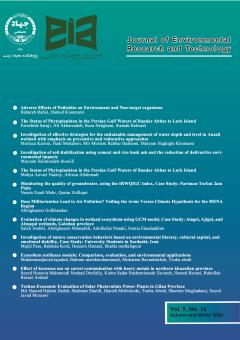Investigation of effective strategies for the sustainable management of water depth and level in Anzali wetland with emphasis on preventive and restorative approaches
Subject Areas : اقتصاد محیط زیست
morteza karimi
1
![]() ,
hadi Modabberi
2
,
hadi Modabberi
2
![]() ,
Mirmoslem Rahbar hashemi
3
,
Maryam Haghighi khomami
4
,
Mirmoslem Rahbar hashemi
3
,
Maryam Haghighi khomami
4
![]()
1 - Researcher, Department of Water Resources Monitoring, Environmental Research Institute, Academic Center for Education Culture & Research (ACECR), Rasht, Iran
2 - Assistance Professor, Department of Water Resources Monitoring, Environmental Research Institute, Academic Center for Education Culture & Research (ACECR), Rasht, Iran
3 - Instructor, Department of Water Resources Monitoring, Environmental Research Institute, Academic Center for Education Culture & Research (ACECR), Rasht, Iran
4 - Assistance Professor, Department of Water Resources Monitoring, Environmental Research Institute, Academic Center for Education Culture & Research (ACECR), Rasht, Iran
Keywords: Water level stabilization, Depth, Anzali wetland, Restoration approach, Preventive approach, Sustainable management,
Abstract :
Wetlands are complex and valuable ecosystems that host a wide range of organisms. Preserving such sensitive ecosystems and maintaining their environmental, economic, and social functions require determining their ecological water needs. The aim of this study is to examine possible methods for the sustainable management of the water depth and level in the wetland and to provide suitable strategies accordingly. Given that the water level of Anzali Wetland is hydraulically affected by the Caspian Sea level and the discharge of the rivers flowing into it, this study seeks to identify and analyze the key factors contributing to the reduction in the wetland's depth and level. It further evaluates various structural and non-structural strategies through comprehensive studies and presents appropriate options for sustainable wetland management. Accordingly, this study investigates both preventive and restorative strategies to enhance the depth and water level of the wetland, aiming to preserve and restore its ecological functions and sustainability. In the preventive approach, actions such as monitoring and preventing unauthorized water extraction, controlling erosion and sedimentation, implementing biological and mechanical watershed management operations, rehabilitating sediment traps, constructing check dams in rivers to increase basin concentration time, and managing incoming pollutants to the wetland have been considered. In the restorative approach, strategies such as hydrodynamic modeling of Anzali Wetland within a comprehensive planning framework, improving irrigation network water-use efficiency, environmentally-assessed dredging operations, combating invasive plant species, and feasibility studies of structural interventions for regulating and stabilizing the wetland’s water level have been addressed. This research ultimately aims to support the preservation and rehabilitation of the wetland’s functions and its ecological sustainability.
